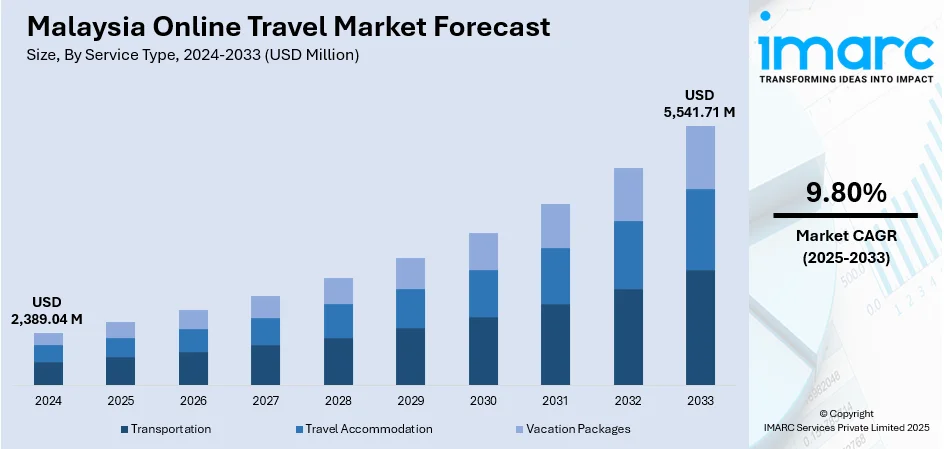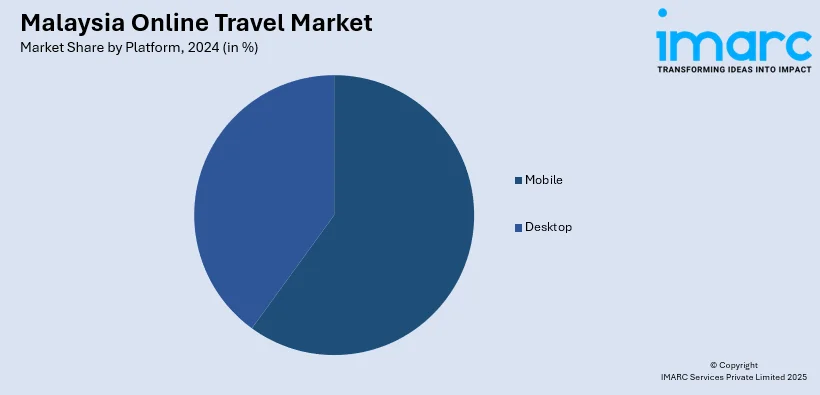
Malaysia Online Travel Market Size, Share, Trends and Forecast by Service Type, Platform, Mode of Booking, Age Group, and Region, 2025-2033
Malaysia Online Travel Market Overview:
The Malaysia online travel market size reached USD 2,389.04 Million in 2024. The market is projected to reach USD 5,541.71 Million by 2033, exhibiting a growth rate (CAGR) of 9.80% during 2025-2033. The sector is witnessing strong growth, fueled by rising internet penetration, growing disposable incomes, and enhanced use of digital booking channels. The rise of social media travel influencers and content-driven marketing is significantly shaping consumer preferences, especially among Gen Z and millennials. Online bookings are particularly marked among younger age brackets, while regional trends indicate strong movement in urban areas. This shifting scenario indicates an upbeat trend in the Malaysia online travel market share.
|
Report Attribute
|
Key Statistics
|
|---|---|
|
Base Year
|
2024
|
|
Forecast Years
|
2025-2033
|
|
Historical Years
|
2019-2024
|
| Market Size in 2024 | USD 2,389.04 Million |
| Market Forecast in 2033 | USD 5,541.71 Million |
| Market Growth Rate 2025-2033 | 9.80% |
Malaysia Online Travel Market Trends:
Surge in digital bookings and mobile integration
A pronounced shift toward mobile-first booking behaviors is defining travel planning in Malaysia. In 2024, mobile devices emerged as the preferred medium for travel reservations, signaling a fundamental change in consumer expectations. This shift is supported by Malaysia’s continued investment in nationwide connectivity infrastructure under the (JENDELA initiative), which has expanded 4G and 5G coverage to nearly all populated areas. In response, travel platforms have adopted technologies such as progressive web apps, voice-search capabilities, and AI chatbots to ensure smooth, real-time planning and booking. These tools are particularly appealing to younger travelers, including Millennials and Gen Z, who seek immediate confirmation, intuitive interfaces, and seamless digital experiences. Businesses are increasingly focused on optimizing their platforms across mobile devices and embedding simplified payment systems. Looking ahead, mobile-centric services are no longer optional, they are baseline expectation. Travel providers that fail to adapt to evolving technologies risk falling behind, as these innovations underscore the broader direction of Malaysia online travel market trends.

To get more information on this market, Request Sample
Emphasis on growth through customer-centric personalization
Throughout Southeast Asia, there is increasing groundswell to personalize digital travel solutions. Travel websites are increasingly using machine learning (ML) technology to monitor users' surfing behavior, travel history, and interests, enabling them to make extremely personalized recommendations and tailor-made holiday packages. In Malaysia, these technologies are employed to customize everything from destination recommendations to accommodations and activities, accompanied by real-time capabilities such as location-based offers, halal-compliant filtering, and interactive previews. Virtual and augmented reality (AR) tools further accelerate the planning process, enabling travelers to visualize accommodation or destinations prior to reservation. As consumers increasingly call for more relevance and efficiency, platforms are giving precedence to smart, data-driven interfaces that answer such demands. In 2025, this focus on personalization will have a major impact on platform loyalty, consumer satisfaction, and repeat use. Personalization's evolution in Malaysia's digital travel space is no longer a new trend it has become the standard. This increasing focus on customization is directly adding to Malaysia online travel market growth.
Expansion of experiential and eco-conscious travel offerings
Tourists in Malaysia are increasingly looking for responsible and meaningful travel experiences. Domestic tourism over the past years has recorded growing interest in nature and cultural destinations like Sabah and Penang, which indicate a desire for authenticity and sensitivity to the environment. In response, travel websites have incorporated into packages immersive activities such as rainforest hikes with guides, overnight stays in heritage villages, and eco-lodges. These, too, now offer features to assist travelers in assessing sustainability, e.g., filters for eco-certified lodgings and choices for low-carbon travel. These functions enable travelers to make more savvy, ethically sound travel decisions and contribute to local communities at the same time. The embedding of virtual previews and responsible tourism metrics is a part of a larger movement in consumer values. By 2025, these types of offerings will become normal, not add-ons, in the process of booking travel. As digital travelers increasingly value low-impact and locally enhancing travel experiences, sites emphasizing sustainability will be more likely to achieve long-term success. Such shifting tastes are a significant part of Malaysia online travel market.
Malaysia Online Travel Market Segmentation:
IMARC Group provides an analysis of the key trends in each segment of the market, along with forecasts at the country and regional levels for 2025-2033. Our report has categorized the market based on service type, platform, mode of booking, and age group.
Service Type Insights:
- Transportation
- Travel Accommodation
- Vacation Packages
The report has provided a detailed breakup and analysis of the market based on the service type. This includes transportation, travel accommodation, and vacation packages.
Platform Insights:

- Mobile
- Desktop
A detailed breakup and analysis of the market based on the platform have also been provided in the report. This includes mobile and desktop.
Mode of Booking Insights:
- Online Travel Agencies (OTAs)
- Direct Travel Suppliers
The report has provided a detailed breakup and analysis of the market based on the mode of booking. This includes online travel agencies (OTAs) and direct travel suppliers.
Age Group Insights:
- 22-31 Years
- 32-43 Years
- 44-56 Years
- Above 56 Years
A detailed breakup and analysis of the market based on the age group have also been provided in the report. This includes 22-31 years, 32-43 years, 44-56 years, and above 56 years.
Regional Insights:
- Selangor
- W.P. Kuala Lumpur
- Johor
- Sarawak
- Others
The report has also provided a comprehensive analysis of all the major regional markets, which include Selangor, W.P. Kuala Lumpur, Johor, Sarawak, and others.
Competitive Landscape:
The market research report has also provided a comprehensive analysis of the competitive landscape. Competitive analysis such as market structure, key player positioning, top winning strategies, competitive dashboard, and company evaluation quadrant has been covered in the report. Also, detailed profiles of all major companies have been provided.
Malaysia Online Travel Market News:
- September 2024: Malaysia Airlines has teamed up with travel website Wego to make it easy for passengers to book its domestic and international flights through Wego's website and app. The partnership enables passengers to view a wider range of domestic and international routes flown by Malaysia's national carrier. The partnership helps increase Malaysia Airlines' visibility on Wego's marketing platform, promoting the airline's award-winning Malaysian hospitality. Part of this initiative, Wego is also growing its Kuala Lumpur office, further establishing Malaysia's central position in the alliance and bolstering the airline's digital expansion.
Malaysia Online Travel Market Report Coverage:
| Report Features | Details |
|---|---|
| Base Year of the Analysis | 2024 |
| Historical Period | 2019-2024 |
| Forecast Period | 2025-2033 |
| Units | Million USD |
| Scope of the Report |
Exploration of Historical Trends and Market Outlook, Industry Catalysts and Challenges, Segment-Wise Historical and Future Market Assessment:
|
| Service Types Covered | Transportation, Travel Accommodation, Vacation Packages |
| Platforms Covered | Mobile, Desktop |
| Mode of Bookings Covered | Online Travel Agencies (OTAs), Direct Travel Suppliers |
| Age Groups Covered | 22-31 Years, 32-43 Years, 44-56 Years, Above 56 Years |
| Regions Covered | Selangor, W.P. Kuala Lumpur, Johor, Sarawak, others |
| Customization Scope | 10% Free Customization |
| Post-Sale Analyst Support | 10-12 Weeks |
| Delivery Format | PDF and Excel through Email (We can also provide the editable version of the report in PPT/Word format on special request) |
Key Questions Answered in This Report:
- How has the Malaysia online travel market performed so far and how will it perform in the coming years?
- What is the breakup of the Malaysia online travel market on the basis of service type?
- What is the breakup of the Malaysia online travel market on the basis of platform?
- What is the breakup of the Malaysia online travel market on the basis of mode of booking?
- What is the breakup of the Malaysia online travel market on the basis of age group?
- What is the breakup of the Malaysia online travel market on the basis of region?
- What are the various stages in the value chain of the Malaysia online travel market?
- What are the key driving factors and challenges in the Malaysia online travel market?
- What is the structure of the Malaysia online travel market and who are the key players?
- What is the degree of competition in the Malaysia online travel market?
Key Benefits for Stakeholders:
- IMARC’s industry report offers a comprehensive quantitative analysis of various market segments, historical and current market trends, market forecasts, and dynamics of the Malaysia online travel market from 2019-2033.
- The research report provides the latest information on the market drivers, challenges, and opportunities in the Malaysia online travel market.
- Porter's five forces analysis assists stakeholders in assessing the impact of new entrants, competitive rivalry, supplier power, buyer power, and the threat of substitution. It helps stakeholders to analyze the level of competition within the Malaysia online travel industry and its attractiveness.
- Competitive landscape allows stakeholders to understand their competitive environment and provides an insight into the current positions of key players in the market.
Need more help?
- Speak to our experienced analysts for insights on the current market scenarios.
- Include additional segments and countries to customize the report as per your requirement.
- Gain an unparalleled competitive advantage in your domain by understanding how to utilize the report and positively impacting your operations and revenue.
- For further assistance, please connect with our analysts.
 Request Customization
Request Customization
 Speak to an Analyst
Speak to an Analyst
 Request Brochure
Request Brochure
 Inquire Before Buying
Inquire Before Buying




.webp)




.webp)












